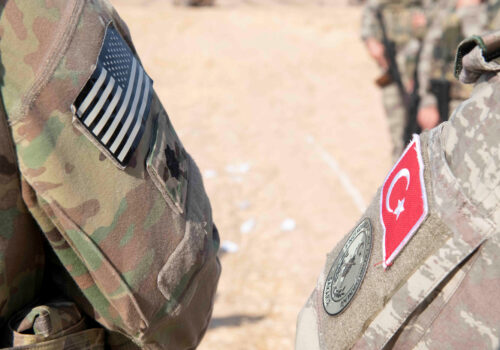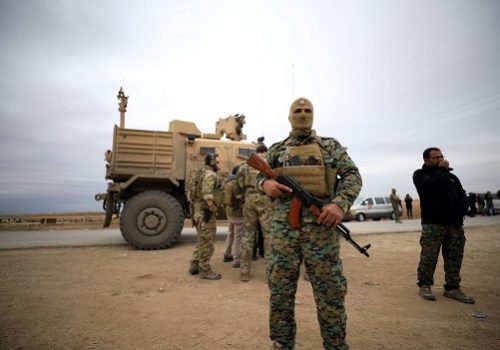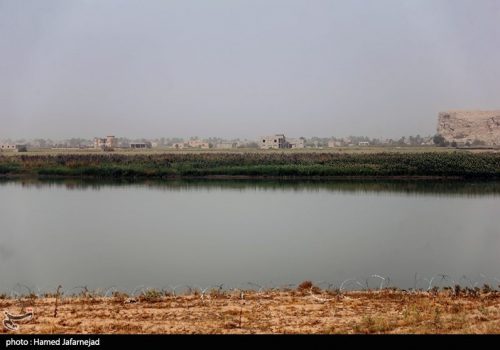American passivity and weakness shine in Idlib province
The Assistant to the President for National Security Affairs, Robert O’Brien, recently reinforced the Assad regime’s and Russia’s sense of impunity in targeting civilians in Syria’s Idlib province and threatening Turkey with the following statement: “I do not think we are going to intervene militarily in Idlib to straighten out that bad situation.” In a tribute to foreign policy continuity, the Trump administration upholds its predecessor’s Syria policy of gratuitously communicating passivity and weakness to adversaries.
The danger in communicating weakness—publicly, no less—is that adversaries often take the message literally and act accordingly. Former President Barack Obama, in erasing his own chemical weapons red line, convinced Russian President Vladimir Putin that the United States would stand firm nowhere. Putin assaulted Ukraine and intervened in the 2016 presidential election with a powerful sense of impunity.
By assuring Iran that its Syrian client would be immune from US military strikes, the lives of Syrian civilians were needlessly traded by the Obama administration for the 2015 nuclear deal. Although the Trump administration retrieved a measure of American credibility by twice retaliating militarily for regime chemical attacks on civilians, it has all but declared that Assad may do as he wishes to civilians, provided he does so without chemicals. And now the national security advisor has gone out of his way to put Russian and Syrian regime minds at ease as a vicious campaign of civilian-centric state terror drives hundreds of thousands of terrified refugees in the direction of Turkey.
No, this is not a call for armed confrontation with Russian forces in Syria. Quite the contrary. To minimize the possibility that Russians, Syrians, and Iranians will go too far in jeopardizing the security of NATO ally Turkey by inflicting mass homicide on defenseless Syrian civilians—inadvertently provoking an American military defense of an ally—those who engage in mass murder must not be assured of American passivity. Surely the United States has assured Ankara that there are conceivable circumstances in Syria where Washington would come to the military aid of an ally. Why then run the potentially explosive risk of assuring adversaries that American military intervention is off the table?
Indeed, the Kremlin should be told privately that a point could be reached in Idlib province where Turkey would feel obligated to intervene militarily against regime forces on a massive scale. And, if that happens, the United States would help defend its ally from the air if such support is required. This must not be a red line bluff. But if Washington truly wishes to minimize the possibility of military events in Idlib province spinning out of control, it will do the Kremlin the favor of allowing it—for a change—to worry about the potential consequences of conflict and escalation.
The Trump administration recently paused Iran’s permanent sense of escalatory dominance over the United States by killing the kingpin of Iran’s violently interventionist campaigns in the Levant and Iraq, Major General Qasem Soleimani. Given that a forty-year habit of taking American escalatory fears for granted will not be easily broken, similar operations may be required in the future. Yet for those in the West who truly wish to avoid war with Iran, ensuring that Tehran—not just Washington—sees limits is vitally important. Nothing could lead to war more surely than Iran acting on the belief that American fear of wider war is the decisive variable.
So it is in Syria now, and so it was during the decades of the Cold War. Was the Soviet decision to put missiles in Cuba not the result of a calculation, based on previous impressions, that President John F. Kennedy would not react forcefully? Was the prospect of nuclear war not heightened exponentially by that Kremlin calculation?
As they consider how many Syrian civilians they will slaughter and how many they will stampede in the direction of Turkey, should Messrs. Putin and Assad be spared all worry that Washington would come to the aid of Ankara with decisive military support? If one wants regime and Russian mass murder in Idlib province to spark a wider conflict, by all means assure these parties of American disinterest and passivity. If one wants effective diplomacy aimed at stopping the slaughter and protecting the peace, back it up with something more than hand-wringing communiques. Do not, under any circumstances, issue gratuitous reassurances to parties whose grotesque criminality threatens an ally while murdering innocents.
Ambassador Frederic C. Hof is Bard College’s Diplomat in Residence and a Distinguished Senior Fellow at the Atlantic Council.
Image: Trucks carrying belongings of displaced Syrians in the town of Sarmada in Idlib province, Syria, January 28, 2020 (Reuters)


